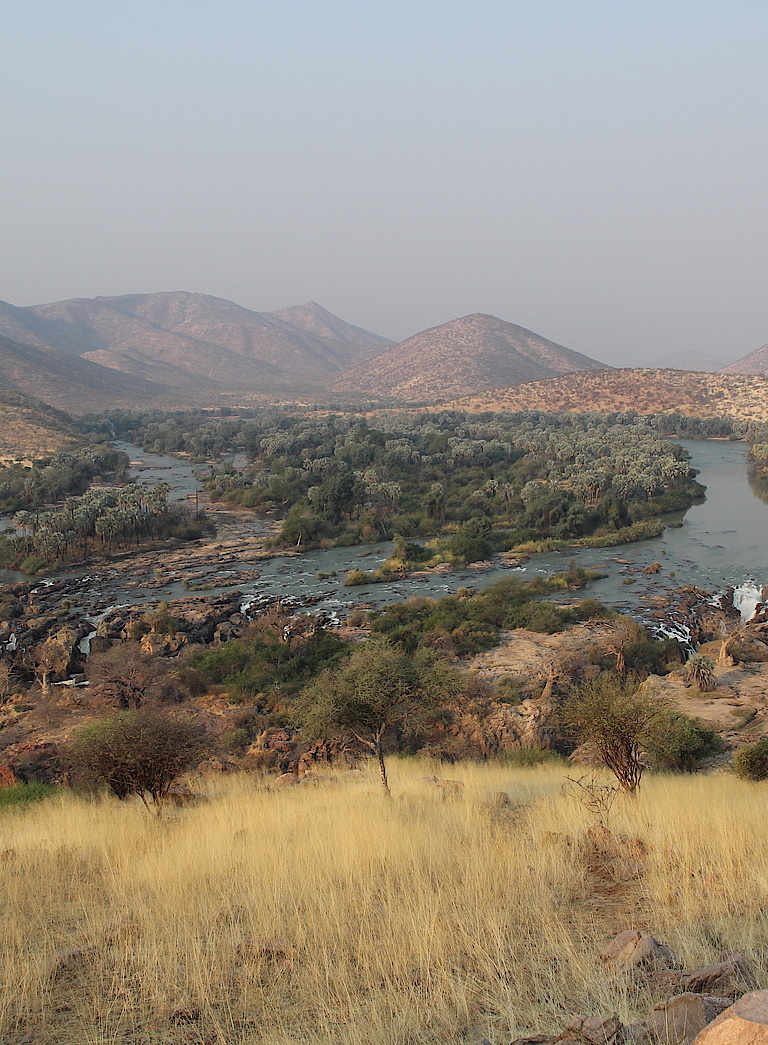- Gap analysis 2017, supporting ABS strategy and consecutive stakeholder consultations on ABS framework, support and advice to drafting ABS law, continuous input until bill was gazetted to an act in 2018
- Supporting stakeholder consultations on ABS regulations, providing continuous advice and support to drafting regulations - to be finalized in 2021
- Through Natural Justice support, establishing a BCP with communities in Babwata National Park, North Namibia (see separate text by NJ)
- Regular exchange with MEFT on ABS permitting structure and interfaces with other INP relevant permitting procedures.
- Invitation and support of Namibian stakeholders from MEFT, IPLC and SMME to participate in international events related to the natural product sector, i.e. the UEBT conferences Beauty of Sourcing with Respect in Paris (2016-2019). Development of business relations and learning about industry needs and practices in the cosmetics, pharmaceutical and neutraceutical sector
The first southern African workshop on the potential for collaboration on sustainably growing the Marula sector in the region took place in Windhoek (Nov 2019), discussing the elements of the regional dimension identified in previous national Marula focused events in South Africa. (see Marula workshop report). The workshop stimulated NAM Marula stakeholders (resource owners, harvesters, oil / juice producers, exporters) to more closely co-operate at national level). It kicked off the process of establishing a Marula collaboration cluster under NANCii. NANCii represents Namibian stakeholders in the discussion of next steps towards a regional Marula development plan and opportunities to cooperate with neighboring countries, including regarding other transboundary resources.
The Namibian Ministry of Environment, Forestry and Tourism (MEFT) participates actively in an ABioSA supported exchange of ABS Focal Points / Competent National Authority (CNA) from South Africa (RSA), Zimbabwe (ZIM), Botswana (BOT), identifying common ABS approaches related to transboundary resources in the regional Marula context. With the help of Natural Justice, the role of traditional knowledge attached to the respective resources is in focus and the to use of BCPs are being examined to ensure community participation and integration in value chains. In collaboration with the South African Department of Forestry, Fisheries and the Environment (DFFE), the project team has developed a declaration of ethical conduct which forms the jointly agreed basis for the implementation of the transboundary Biocultural community protocol processes and related activities.
In December 2020, ABioSA, in collaboration with the South African National Biodiversity Institute (SANBI), hosted a workshop to explore the potential of long-term national and regional resource assessment and monitoring programmes to ensure sustainability of plant species underpinning the fast-growing southern African biotrade. Representatives from Namibia participated in the workshop. This initiative closely links to the third activity of BioInnovation Africa activity described below.
Namibia provides the best pre-conditions for successful support by BioInnovation Africa: An advanced regulatory ABS framework with vast experiences in community benefit-sharing agreements, best practices in using its biodiversity assets sustainably with tangible conservation impacts and an increasingly formalized organized natural products sector which is eager to innovate and scale up.
Thus, support is provided to increase the effectiveness of the Namibian ABS system by developing stakeholder specific “How-to?” manuals on PIC, MAT and permitting processes. In parallel, the latter are being transferred largely to an MEFT based online IT system to ease procedures related to ABS and research permits for regulators and users of biological and genetic resources from research and industry.
Further, based on stocktaking studies related to national and local conservation approaches as well as financial mechanisms, guidelines and concepts are being elaborated to guide how ABS-compliant value chains can contribute to the sustainable management of biodiversity.
However, the backbone of the BIA project in Namibia consists of seven value chain business partnerships between Namibian cooperatives and SMME with European industry in the cosmetic, nutraceutical and flavor and fragrance industries. These collaborations range from (bio-) prospecting and R&D in new active ingredients to EU market introduction of traditional ingredients and upscaling and diversification existing export value chains. The partnerships are aligned on the UNCTAD BioTrade Principles and Criteria and eventually contribute to improved conservation impacts while creating more and better jobs alongside the respective value chain.
